
foreword | Historical Narratives | Resources | Links | Contact
TAX ME TO THE TEETH
History is the life and times of humanity.
 |
|
|
"Tax me to the teeth," cried a British politician, "and I will cheerfully stint myself to contribute to the Loyalists' relief." This generous if somewhat impetuous pledge reflected the realization in Britain that the Loyalists had been treated shabbily and any hope of their ever being compensated for their losses by the American Congress was non-existent. If "that motley mess," as some called the Loyalists, were ever to receive recompense for losses resulting from "the commotions of the Empire," it would have to come from the Crown.
Following the defeat of Britain by the American colonists, the partnership of George III and Lord North collapsed and Lord North resigned as prime minister. When North subsequently took up the cause of the Loyalists, cynics suggested his support for these unfortunate people was prompted more by his wish to embarrass the new government, than to embrace the Loyalists' appeal.
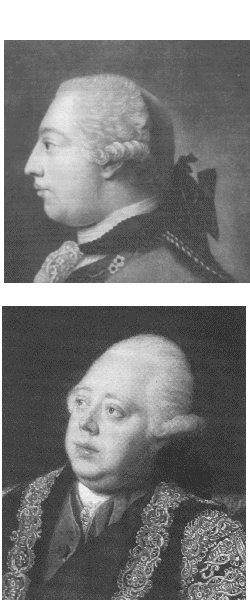 |
|
George III (top) & Lord North (bottom) |
In an impassioned address to Parliament, Lord North declared,
In His Own Words "Never was the honour, the principles, the policy of a nation so grossly abused as in our desertion of the Loyalists, who are now exposed to every punishment that desertion and poverty can inflict - All BECAUSE THEY WERE NOT REBELS."The new Prime Minister, Lord Shelburne, initially agreed, counselled kindness and stated that "with less than one-fifth the expense of a year's military campaign happiness and ease could be given to the Loyalists." Later to the Loyalists's lament for compensation Shelburne's response was less kindly and more curt. "A part must be wounded that the whole Empire may not perish." Some had to suffer for the government's failure to defeat the rebelling Americans and unfortunately that was the Loyalists.
Shelburne resigned following the rejection of the terms of his peace treaty with the Americans which the Members of Parliament considered too humiliating. They believed British negotiators had conceded too much to the Americans and were very happy to be able blame the calamity of Britain's unexpected defeat on someone as shady as Shelburne whose contemporaries could never be sure where he would stood on any issue. Shelburne never suffered the
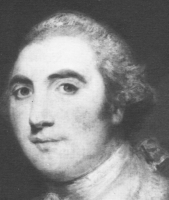 |
|
Earl of Shelburne |
the same neglect, however, and was granted the Order of the Garter by the king.
The problems of peace and the payment to the Loyalists were passed on to his successor as prime minister, William Pitt. Pitt's government promptly settled with the Americans on basically the same terms as Shelburne and this time Parliament approved the settlement.While most Loyalists called for compensation some sought compassion. These were Loyalists who changed their minds about leaving house and home and decided instead to return to their homeland where they hoped they might live out "the evening of their lives" among friends of former years. This decision for many was ill-advised and foolhardy in the extreme. The properties they wished to reclaim had been quickly occupied by "loyal rebels" who had no intention whatsoever of relinquishing the spoils of war to traitors who wanted the patriots to forget and forgive. The rebels harboured intense hatred towards these laggard Loyalists who had supported the Crown and now in defeat wanted to creep back into the country they had betrayed. Rebels warned them to beware that "hempen cravates" would once again be in fashion for those who thought they could "turn-coat twice." A number of the returning Tories suffered the fate of one Loyalist who no sooner arrived in Georgia than "in a few days was not in being."
Committees had been formed throughout the new American republic to ensure that no returning Loyalists recovered their properties or possessions. While elected American officials professed to be shocked by the unlawful actions of these vengeful, menacing mobs, they maintained they were unable to suppress them because the rebel gangs proclaimed that all authority was now derived from the commoners of the new republic. Power had indeed passed to the people.
Winston Churchill referred to the Loyalists as "these proud folk rewarded with the unremunerative but honourable title of United Empire Loyalist." The Loyalists wanted something more tangible than titles, so on the recommendation of Lord North they organized themselves into a committee to improve their chances of getting what they thought they deserved. The committee composed of one representative from each of the 13 Colonies was "to enlighten the British public." This lobby group submitted their "case and claim for justice" to Prime Minister Pitt. They justified their cause by stating that it was "an established rule that all sacrifices made by individuals for the benefit or accommodation of others shall be equally sustained by all those who partake of it." They had suffered on behalf of the whole country and the whole country should now compensate them for their losses.
 |
|
|
In his Speech from the Throne on the opening of Parliament George III referred to the "American sufferers" who from motives of loyalty to their Sovereign or attachment to the mother country had "relinquished their properties and professions." He trusted "generous attention would be shown to them."
Parliament believed the Loyalist petition was "well-founded" and passed the Compensation Act of July, 1783 which established a commission of five judicious persons to inquire into the losses and services of all such persons who have suffered in their rights, properties and professions during the late, unhappy dissensions in America in consequence of the loyalty to His Majesty and attachment to the British government and to make settlement thereon.
The claimants were divided into six classes.
1st - those who had rendered services to Great Britain;
2nd - those who had borne arms for Great Britain;
3rd - Uniform loyalists;
4th - Loyal British subjects resident in Great Britain;
5th - Loyalists who had taken oaths to the American states but afterwards joined Great Britain;
6th - Loyalists who had borne arms for the American states but afterwards joined Great Britain.
 |
|
British Parliament |
The five commissioners rented quarters in Lincoln's Inn Fields in London, where most of the important claims were presented. A committee of Loyalists, one for each of the former colonies, helped the commissioners with their knowledge of local conditions in each of the colonies. William Pepperell, grandson of the hero of Louisbourg and Joseph Galloway, an eminent Loyalist leader and writer, were two of the commissioners. They were shocked and staggered by the amounts demanded by the Loyalists.
 |
|
Money, Money, Money |
To assist the petitioners to prepare their submissions to the commission a guide was designed which sold briskly at a shilling a copy. Hearings were held first in London but since many of those claiming compensation could not afford to cross the sea to present their claims the commissioners went to them. In 1785 Colonel Thomas Dundas and Jeremy Pemberton went to Nova Scotia and to Canada, where they met at Halifax, Shelburne, St. John, Quebec, Montreal and Niagara. John Anstey, a London lawyer, was sent to New York.
Wide notice was given of their presence at the various places but doubtless many Loyalists living in the remoter regions never knew of their existence. Loyalists stated their case in submissions to the commissioners in letters to newspapers and in petitions to Members of Parliament. The Public Record Office in London is filled to overflowing with hundreds of pounds of paper pleas for compensation submitted long ago by Loyalists to government bureaucrats and ministers of the crown. Some even sent petitions to the King himself. All waited in hopeful anticipation of receipt of payment in full for the services they rendered to their sovereign..
 |
|
|
The following submission to the House of Commons in 1786 describes the pathetic situation in which Loyalists found themselves.
"It is impossible to describe the poignant distress under which many of these persons now labour and which must daily increase should the justice of Parliament be delayed until all claims are liquidated and reported. Ten years have elapsed since many of them have been deprived of their fortunes, their helpless families reduced from independent affluence to poverty and want. Some are now languishing in British jails, unable to pay their debtors. Provision should now be made for payment of those whose claims have been settled and reported. It will not only relieve them of their distress but give credit to others whose claims remain to be considered and enable them all to provide for their wretched families and become again useful memories of society."
Conditions were tragic in many instances particularly during The Hungry Year of 1788. Settlers were faced with crop failures, shortage of food and a severe winter. Many were the touching stories of this sad first chapter in the history of Upper Canada when the cry was heard for bread! bread! bread! As spring advanced and the buds of the trees began to swell, new leaves were gathered and eaten. Roots were dug out of the ground and eaten. Bark of certain trees was stripped off and consumed as food. Beef bones were not only boiled again and again but actually carried from house to house to give a little taste to boiled bran until there remained no taste left in the boiling water.
 |
|
|
The harsh environment was softened to some extent for the settlers by the gentleness and generosity of the local Mississaugas who taught them how to catch fish with hooked sticks, get sugar from the maple tree, seek nourishment from roots and nuts and prepare hides for bedding and clothing. Natives taught the settlers how to manufacture garments out of deer skin. Trousers made of leather were not only comfortable but durable. Petticoats were made of the same material. Moccasins were produced from buckskin and if enough deer skin was left over it was used to make coverings for beds.
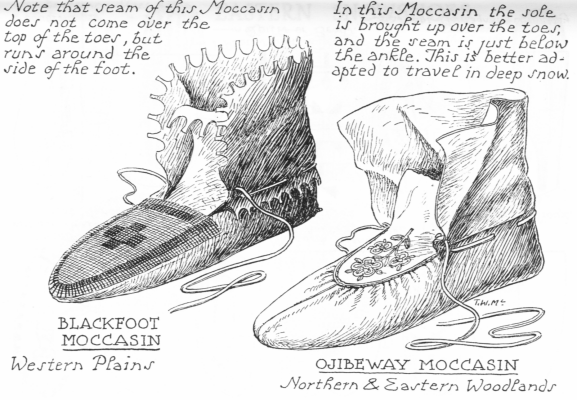 |
|
|
A full account of the proceedings of the commission was published by one of the commissioners in 1815. Its work was thorough - some thought much too thorough. Its cautious queries were described by more than one disgruntled supplicant as "savouring too much of the Inquisition."/p> Each applicant was questioned under oath in a private room. Every claim required evidence to support it in the form of a deed, written proof of confiscation or a guarantee given by some respected person. Claims were classified according to the amount of patriotic fervor one had displayed in support of the sovereign. Evidence of this included: the number of slaves lost; the value of property owned and lost; the loss of any salary as a result of being forcibly removed from what had been a royal office; and any loss of actual professional income.
 |
|
|
Reimbursement was usually well under the amount documented and it normally never exceeded half that claimed. Fakers with false petitions, or as they were called, "moonshine clams," were given short shrift and quickly rejected. Witnesses to the losses suffered were widespread and any lies or outrageous claims were quickly exposed. Rich Loyalists fared better than poor; white Loyalists received more than black Loyalists.
The commissioners were very arrogant and continually expressed suspicion and skepticism at how people of such low social standing in Britain could ever have been able to better themselves so quickly in America. What the skeptical commissioners failed to realize was that with dedication and hard work colonists' entry into higher positions was possible because people were less preoccupied with class and rank. The new world unshackled by staid traditions changed more rapidly than the old. It was possible for people to rise faster and higher in the new world than in the old. The commissioners also displayed an excessive sense of responsibility for the public funds they administered, seldom erring on the side of generosity.
 |
|
|
The following excerpt is taken from a submission made before Commissioner Pemberton at the Proceedings of Loyalist Commissioners at Halifax 1785-6. The claimant was Joshua Pell who eventually became a resident of Chippawa, Upper Canada and after whom Pell Street is named.
"Number 462
Case of Joshua Pell, late of Pelham Manor, New York, Esq.
Claimant Sworn, saith:
He is native of New York. At Commencement of the troubles he tried all in his power to persuade the Rebels they were wrong in opposing Governmt.Declared his sentiments & endeavoured to Convince people they were wrong & had thereby made himself obnoxious. Before the Troubles, he was 1st. Lieut. To the Militia of Pelham & New Rochell & when Americans took Arms, his Compy, almost to a man, chose him Capt., but he declined serving the Cause of Rebellion. He declined because he did not choose to take Arms against the British Constitution. Remained in New York Province & made excursions to Collect Information which might be useful to the British Army. Acted as a guide to ye Army. Received 200 pounds from the British Govt., a reward for his services. Commanded a Company of City Militia in New York. Produced certificates from David Mathews, late Mayor of New York, to his honesty and unshaken Loyalty & to his sufferings in the Cause. Produced an order from Govr. Tryon, 1776, to embody the Militia at White Plains. Property - 200 acres in Manor of Pelham in County of WestChester, with 3 Dwelling houses, 2 orchards & improvements, ploughed fields & mowed grounds, all enclosed with Stone Walls. Twenty acres were soft meadow, 40 Acres Wood Land, Convenient for Trade. Thinks it would have sold for 15 pounds per acre. He possessed this under his father's will. Father died 2 years before Claimant left New York. His father remained at New York, not in his sound senses. Will made before the Troubles. Claimant laid out considerable sums in Improvements purchased in the War, thinking Britain should carry the Day. When he was going away he had put Barrels on Board the Sloop, When American Troops commanded by Col. Dyer, came down on purpose against him as he understood. Claimant made his escape out the back door. The troops then took ye Barrels containing 54 Barrels of Pork; 319 Pine Planks, 132 boards; 15 Leads; A Sail and Bib work total of 413 pounds. 150 bushels of wheat were taken as well 20 Tons of Hay, two horses, some cows and an Ox. A Certificate was produced 27th of Novr., 1783, from Notary Public stating Claimant swore to his Loss of the Value of 1393 Pounds, New York currency."
Despite the fact that few Loyalists were fully compensated for their financial losses, historians agree that Britain acted generously although with "culpable dilatoriness." Compensation came but slowly. A bleak picture of the extreme poverty resulting from this delay was published in 1788.
"It is well known that this delay of justice has produced the most melancholy and shocking events. A number of sufferers have been driven to insanity and become their own destroyers, leaving behind them their helpless widows and orphans to subsist upon the cold charity of strangers. Others have been sent to cultivate the wilderness for their subsistence, without having the means and compelled through want to throw themselves on the mercy of American States and the charity of former friends to support the life which might have been made comfortable by the money long since due by the British government; and many others with their families barely subsisting upon a temporary allowance from Government, a mere pittance when compared to the sum due them."
The commission operated from 1785 until 1789 examining between four and five thousand claims. Its report contained 1436 pages containing 1401 claims. A further 843 claims were never heard. Compensation awards ranged from $50 to $221,000, the latter amount going to Sir John Johnson, Superintendent of Indians.
His "Majesty's Yankees" cost the British government the extraordinary sum of 30 million pounds. While losses "in consequence of loyalty" were doubtless phenomenal, history contains few examples of people on the losing side of a war who were so fairly compensated. "These refugees experienced a kinder fate than most exiles in the long sad tale of humanity uprooted." In addition to compensation of claims the British government placed Loyalist regiments on half-pay and after a soldier's death their widow received a small pension.
The following list of materials required by the Loyalists was prepared in January, 1785: nails, hammers, gimlets, plains, chisels, gouges, hinges, iron-rimmed locks, padlocks, handsaws, X cut saws, broad axes, adzes, rub stones, whipsaws, window glass, carpenter tools, blacksmith tools, carpenter squares and compasses, hoes, spades, pickaxes, plough shares and twine.
Loyalists also received food and settlement assistance including the following provisions given to each male inhabitant 14 years of age or older:leather for horse collars, two spades, 3 iron wedges, 3 hoes, 3 chisels, 1 gauge, one hand saw and file, one nail hammer, one drawing knife, 2 scythes, 1 sickle and 1 broad axe. Each man and boy also received a coat, waistcoat, breeches, hat, shirt, blanket, shoe soles, leggings and stockings. Each woman and girl over six was allowed two yards of woollen cloth, four yards of linen, stockings, a blanket and shoe soles. Each child under ten was to receive one yard of woollen cloth, two yards of linen, stockings and shoe soles. Two children shared a blanket. For travel, every five persons were allotted a tent and a cooking kettle.
Land was drawn by lot. Locating one's land once the ticket was picked was not an easy task since markers placed by the surveyors were the only guides. Once they found their land weary settlers still had to construct a home and make a farm out of the wilderness.
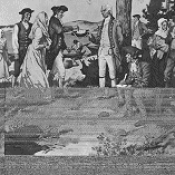 |
|
Drawing by Lot for Land |
The calamity of revolution and cruelty of war had driven into Canada the kind of people needed for its development. The Loyalists had the skills, energy and determination required to tackle and triumph over the North American wilderness. But the shear back-breaking toil needed to conquer the great forests that grew to the water's edge was inconceivably daunting. It defied settlers to find enough open space on their 200-acre property to plant seeds let alone build a cabin. Those who left behind fertile, fenced farms and sturdy even gracious homes stood appalled by the task and the toil that lay before them.
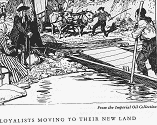 |
|
Locating One's Lot |
Logs were cut for the cabin which was usually a one-roomed structure. Roofs were made of bark or split logs and blankets served as doors. Windows were covered with oiled paper since glass was unobtainable. The chimney was made of rough stones or sticks and and clay. The floors frequently were dirt or clay, the stump of a tree serving as the family table. Provisions were provided until after the first crop of 1786 was harvested. Incredible progress was made the first summer.
Loyalists were described as the conservative doubters of the American Revolution. They refused to believe the rebels who claimed that the British parliament was trying to enslave Americans. They did not agree with American claims that an independent United States would result in a better, freer life for the inhabitants. They doubted the Americans would win the war and when they did Loyalists refused to remain in the new nation. They preferred to abandon all and migrate to Nova Scotia or Canada.
The successful revolution which converted the 13 Colonies into a new nation also created a new Canada populated by people who had lost their land, but not their lustre. The addition of 50,000 Loyalists to the population of British North America injected new vitality into the economic life of the colonies. It extended the frontier of the settlement westward, endowed the colonies with long-lasting traditions of loyalty to the British Crown and commenced far-reaching political and constitutional changes. Loyalists helped found the province of Ontario and did much to mould its early character. They formed the backbone of resistance in the second American war of independence - the War of 1812.
In the early days of the province, Loyalists were responsible for its conservative outlook which expressed Canadian nationalism in terms of British loyalty and allegiance to Empire rather than pride in and patriotism towards Canada as a country. Today the name United Empire Loyalist is esteemed and eagerly espoused by proud descendants of the first Loyalists.
These descendants formed the United Empire Loyalist Association of Canada on the 27th of May, 1914, Its aims are: to unite the descendants; to perpetuate the spirit of loyalty; to collect memorabilia and to construct and repair monuments. Its motto is Ducit Amor Patriae - Patriotism Leads Me.
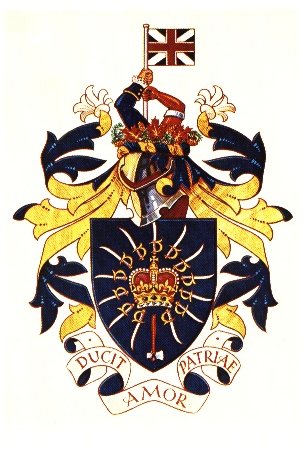 |
|
Ducit Amor Patriae |
Copyright © 2013 Website Administrator